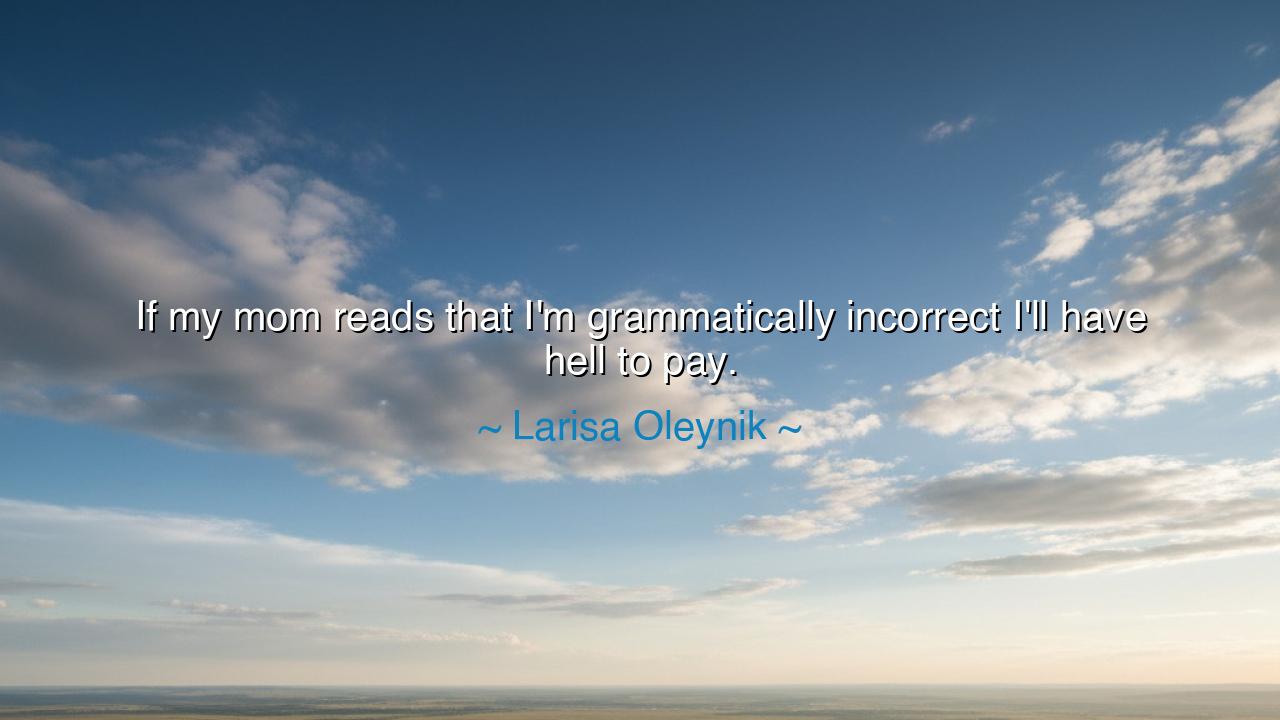
If my mom reads that I'm grammatically incorrect I'll have hell






In the light-hearted yet wise words of Larisa Oleynik, “If my mom reads that I’m grammatically incorrect, I’ll have hell to pay.” we hear not only humor, but the echo of a timeless truth: that a mother’s discipline is one of love disguised as vigilance, and that even the smallest lessons, like the careful use of language, can shape a soul for life. What seems a jest carries the weight of devotion—for behind her mother’s corrections stands a lifetime of care, of standards instilled not to punish, but to uplift. Thus, within laughter we find reverence, and within grammar, the art of precision and respect.
To understand these words fully, one must first see the heart that beats beneath them. The mother in this saying is not a tyrant of syntax, but a guardian of wisdom. To her, language is more than words—it is the expression of thought, the architecture of reason, the mirror of the mind. She corrects not because she seeks control, but because she believes her child’s voice deserves to be strong, clear, and understood. Her insistence upon correctness is, in truth, her way of saying, “Your words matter.” In this way, the mother becomes the first teacher of meaning, the quiet sculptor of a child’s inner world.
From the ancient schools of rhetoric to the quiet hearths of home, parents—especially mothers—have served as the earliest educators of truth. In Athens, where the philosophers taught the art of persuasion, it was the mother who first taught the child to speak with dignity and accuracy. For she knew that language was power: to think clearly is to speak clearly, and to speak clearly is to move the hearts of others. Thus, even a gentle rebuke over grammar becomes a lesson in integrity—reminding the child that how one expresses truth is as sacred as truth itself.
Consider the story of Abigail Adams, wife of John Adams and mother of John Quincy Adams, both leaders of a young nation. In her letters to her son, she corrected his language, his phrasing, and even his spelling—not to belittle him, but to sharpen him. “Take care,” she wrote, “that your words carry the grace of thought.” Her son, who would one day become President, later said that his mother’s letters were his truest education. In her insistence upon form, she taught him substance. Thus, her discipline, like that of Larisa Oleynik’s mother, became the forge of greatness disguised as maternal fuss.
Beneath the jest about “having hell to pay” lies a deeper reflection on accountability and pride. The child raised with high standards learns to respect the craft of their own expression. Whether in writing, speech, or action, they carry the mark of someone who has been lovingly corrected. In time, such correction becomes not a burden but an inheritance—a gift of care that says, “You are capable of better, and I will not let you forget it.” The mother’s eye for detail becomes the conscience that guides the grown child through life, long after her voice has faded from the room.
And yet, this quote also reminds us of the sacred bond between laughter and love. The fear of correction, though exaggerated in humor, reveals the child’s continued desire for the mother’s approval—a desire rooted in affection and gratitude. To jest about a mother’s high standards is to honor them, to acknowledge that even her strictness was an act of tenderness. For the lessons that once caused frustration are later remembered as the seeds of excellence.
Let this then be the lesson: discipline born of love is never punishment—it is preparation. Whether it comes in the form of a mother’s correction, a teacher’s critique, or life’s own sharp lessons, accept it with humility. For in every act of refinement, there is someone who believes in your potential. Speak with care, write with purpose, and let your words reflect both your intellect and your heart.
Thus, as Larisa Oleynik’s humor teaches us, behind every great voice stands a mother who would not settle for carelessness. Her insistence upon correctness was not about grammar alone—it was about truth, respect, and the cultivation of mind. And those who remember her lessons will find that precision, once learned, becomes the foundation of wisdom itself.






AAdministratorAdministrator
Welcome, honored guests. Please leave a comment, we will respond soon